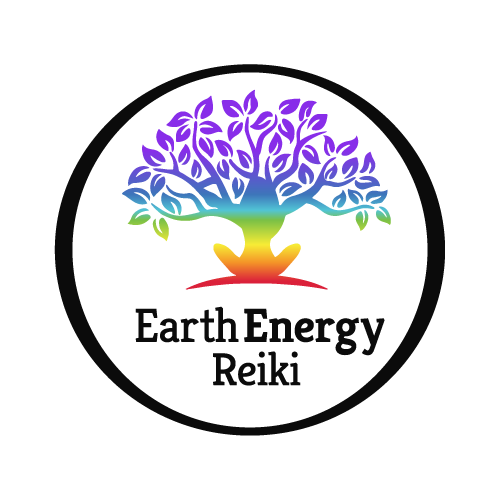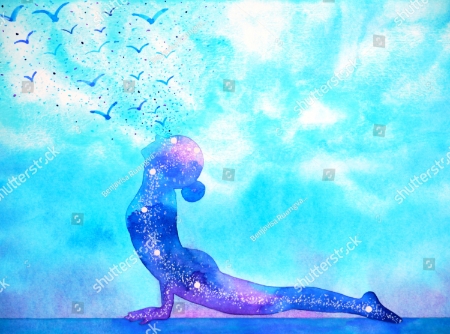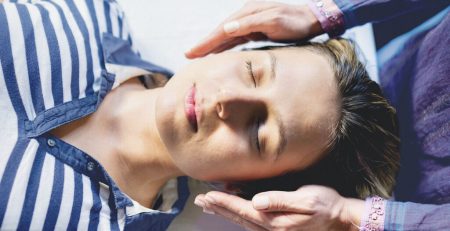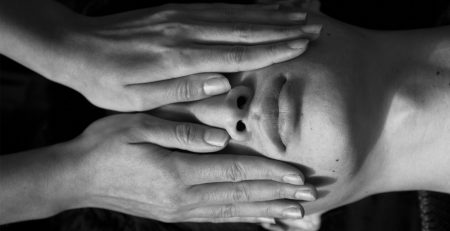Effects of Reiki on Mental Health Care
Abstract
This systematic review aimed to identify the benefits of Reiki in mental health care. Eleven studies were included. Although the number of studies is limited, the results contribute to the potential beneficial role of Reiki in mental health care. Persistent studies using Reiki with broad samples, consistent randomized controlled trials, and patterned protocols are recommended.
BACKGROUND
Within complementary and integrative health practices, Reiki is an ancient practice of Japanese origin widely used worldwide. Through the touch or approximation of the hands, an enabled therapist applies this technique to eliminate toxins, to balance the organism, and to favor the full functioning of the organism, to reestablish the flow of vital energy.1
Reiki as bioenergy therapy works with the energy that leads the human body to a calmer state that is linked to health and cure. Reiki therapists conduct the curing energy that enters the top of the head and leaves through the hands.2
Essentially, the Reiki therapist’s hands are the channels of universal energy that naturally flows to any location on the patient’s body where it is required. The therapist puts his/her hands in a sequence of positions close to the patient’s body, to further self-healing. Reiki can lead to a deep release of feelings or energies that establishes the natural flow of energy in the body and is generally experienced by patients as a feeling of relaxation, welfare, or a clear mind.3
There is expanding interest in Reiki among health care professionals especially nurses who work in hospitals, palliative care, emergency units, psychiatric services, nursing homes, family practice and other contexts.4–6 Frequent contact with the population makes nurses seek alternatives to complement their usual interventions and available to the target audience, promoting health and comfort in an accessible and natural way.7
Reiki is a low-cost and low risk therapy, excellent treatment choice when compared with conventional treatment.8,9 Several studies indicate that using Reiki leads to a decrease in symptoms related to hypertension, anxiety, cancer, depression, sleep disorders, mood disorders, and stress.5,10–13 In addition, it can relieve pain, promote relaxation, and improve self-esteem.14,15 Most studies, however, do not approach people with mental illness.
Currently, more and more people are emotionally, or mentally ill, in situations of stress, frustration, physical, emotional, and mental collapse.5,16 In this sense, its application in mental health care is extremely relevant.
This systematic review proposes to document scientific proof about the benefits of Reiki in mental health care.
METHODS
In this systematic review, the recommendations of the Items of the Preferred Reports for Systematic Review and Meta-Analysis (PRISMA) have been followed to ensure a precise methodology standard and scientific pertinence.17 The question in this systematic review was composed according to the PICO search strategy (Patient, Intervention, Comparison and Results). Thus, this study looks to respond to the following issue: What are the benefits (DO) offered by Reiki (I) to the patient (P) in mental health care.
Selection criteria
In this systematic review, to identify search terms and databases that would best answer our research question, we worked together with a health sciences librarian. We have included studies published without time limitations regarding the year of publication on the evaluation of Reiki in mental health care.
The articles were identified through searches in the electronic databases Embase, PubMed, Scopus, and the Web of Science.
Search strategy and selection
The systematic review strategy included the terms “Reiki” in combination with the terms “Mental Health” AND “Patients.” First, the articles were identified by searching the PubMed database (http://www.pubmed.gov) using the following combination of words: “Reiki” in combination with the terms “Mental Health” AND “Patients” that identified 307 studies. Afterward, bibliographic searches were performed in the EMBASE database, recognizing 136 articles, in the Web of Science 258 articles were identified, and in the Scopus 427 articles. Thus, we selected 1118 articles for critical evaluation.
Quality criteria of the selected articles
In this systematic review, observed that were enforced different methodologies in the studies the articles found. Two reviewers separately evaluated the bias risk in the added studies.
Study selection (search outcomes)
The search in the databases resulted in 1118 articles, 222 studies repeated, leaving 896 for appraisal. After a detailed evaluation of the titles, abstracts, and the eligibility criteria applied, the articles on healing touch and therapeutic touch were eliminated since they are different therapies than Reiki. We also excluded articles that did not include mental health. Then, we selected 12 studies for a complete text review. Finally, we picked 12 studies for a complete text review.
At this stage, an article was removed because Reiki was applied with another technique, and it was not possible to evaluate the scope of the approach separately.5 In meeting the inclusion criteria, we identified an extra article, but found only the summary. We contacted with the researchers who conducted this study, but there was no response to the possibility of making the entire article available, so it was excluded.18 Finally, 11 articles composed this systematic review. The Figure identifies the strategies used to select the articles and reports the rule-out criteria applied in all steps.19
FINDINGS
In this systematic review, 11 studies were included, of these 7 randomized clinical trials, 3 descriptive, and 1 retrospective cohort study. All studies had English as their publication language in the last 30 years (between 1988 and 2018). Regarding the composition of the sample, the articles evaluated people with anxiety, depression, and stress. Primarily female participation occurred in 5 studies,4,14,20–22 in the others there was gender mix, although with women composing much of the sample in the other studies.23–28
Recruitment sites were diverse, including 5 exclusively community samples,14,24–26,28 2 samples at universities,23,27 3 samples at the hospital,4,20,21 and 1 in primary health care.22
Studies were published in 9 journals, most of them on alternative medicine (n = 7) and nursing (n = 3). It is important to note that 63.6% of the journals were from the United States. The studies were primarily conducted by North American (n = 7), European (n = 2), Indian (n = 1), and Brazilian (n = 1) researchers. A complete report of the studies and the major findings were shown in Table 1.
TABLE 1. – Summary of Characteristics Identified in the Selected Articles, Including the Main Results (N = 11)
| Author and Setting | Design | Participants (n) | Study Context | Intervention | Outcome Measures | Study Finding |
|---|---|---|---|---|---|---|
| Richeson et al,23 USA | Clinical trials | Elderly (20) | Community | The experimental group and waiting list (control group). Eight sessions were performed, 1 time/wk with a duration of 30 min each. | Depression, pain, and anxiety | There was an improvement in pain, depression, and anxiety among those who received Reiki when compared with the control group |
| Bowden et al,23 UK | Clinical trial | Psychology students (40) | University | Reiki groups and placebo group. Participants were also assigned to use 3 relaxation/hypnosis techniques. Each participant received 10 sessions of 30 min each for 8 wks. | Depression and anxiety | There was an improvement in mood among participants with high anxiety and/or depression who received Reiki while no change was observed in the controls |
| Erdogan and Cinar,14 India | Clinical trial | Elderly women (90) | Nursing home | Reiki group; control group and simulated Reiki group. Eight sessions were performed weekly for 45-60 min. | Depression | There was a significant decrease in the depression rate of the Reiki group, higher than in the other groups |
| Wardell and Engebretson,25 USA | Retrospective cohort study | Healthy adults (23) | Community | Stress-related biological markers were collected before, during, and immediately after a single session of Reiki lasting 30 min. | Stress, anxiety | There was an elevation of IgA levels, systolic blood pressure drop, and anxiety was significantly reduced |
| Shore,26 USA | Clinical trial | Healthy adults (45) | Community | Reiki group, placebo distance group, and distance Reiki group. Six 1.5 hr sessions were employed, 1 time/wk. | Depression, stress, and hopelessness | A significant reduction in the symptoms of psychological distress in Reiki groups compared with the controls |
| Freitag et al,22 Brazil | Qualitative | Nurses (8) | Health services | Personal interview was conducted after 3 Reiki sessions | Feelings experienced after receiving an application of Reiki | Reiki was found to have improved quality of life for these professionals, balancing the physical, mental, emotional, and spiritual |
| Vitale,4 USA | Qualitative | Nurses (11) | Health services | Personal interview | Experiences and perceptions of self-Reiki | Improvement in daily stress control, self-healing, spirituality, and interconnectivity was reported |
| Bukowski,27 USA | Qualitative | University (32) | University | Stress reduction and relaxation program based on the monitoring of its effects for 20 wk | Stress and relaxation | There was a significant reduction in stress levels |
| Cuneo et al,21 USA | Qualitative | Nurses (17) | Health services | An instrument was applied prior to the Reiki course and after 3 wks of self-practice of Reiki | Realized stress | The results indicated that practicing Reiki often resulted in reduced perceived stress levels |
| Dressen and Singg,28 USA | Clinical trial | Patients with chronic diseases (120) | Community | Reiki group, muscle relaxation group, placebo group, and control. Each group received 10 sessions, from 60 to 90 min each | Pain and psychological symptoms | There was a reduction of pain, depression, anxiety in the Reiki group compared with the other groups |
| Díaz-Rodríguez et al,20 Spain | Clinical trial | Nurses with burnout syndrome (18) | Health services | Reiki group and group placebos. A 30-min Reiki or placebo session was performed. | Biological effects on burnout syndrome | There was an improvement in the IgA and blood pressure response in a 30-min Reiki session |
Organization of a control group and kind of Reiki intervention
Diverse comparison groups were used in the randomized clinical trials. One study worn placebo at a distance,26 the other 4 studies used placebo as a comparative intervention,14,20,23,28 and in 1 study, comparable interventions were not used by researchers.24
Self-application of Reiki
Three studies were found. One was performed in a university sample,27 and 2 were performed on a sample of nurses.4,21
Benefits of Reiki in mental health care
Stress was the variable most often measured, represented in more than 60% of the studies (n = 7).4,20,21,23,25–27 Five studies focused on depression symptoms,14,23,24,26,28 and regarding anxiety, 4 studies evaluated this variable.23–25,28 All authors found a meaningful reduction in stress, depression, and anxiety after Reiki. Several instruments were used to evaluate those variables (Table 2), and a short report of the studies provided, tracked by a brief of the categorizations in general.
TABLE 2. – Instruments Used in Studies to Measure Stress, Depression, and Anxiety
| Variables | Instruments |
|---|---|
| Stress | Biochemical markers14,21 Perceived Stress Scale15,22,23 Scale of Depression, Anxiety and Stress18 |
| Depression | Geriatric depression9,20 Depression, Anxiety, and Stress Scale,18 Beck’s Depression Inventory22,24 |
| Anxiety | Scale of Depression, Anxiety and Stress18 Hamilton Anxiety Scale20 Hospital Anxiety and Depression Scale18 State-Trait Anxiety Inventory21,24 |
Erdogan and Cinar14 conducted a randomized, controlled, experimental study that evaluated the effectiveness of Reiki on people with depression living in nursing homes. Ninety elders were separated into 3 uniform groups (Reiki group, Reiki simulation, and control). There was a significant decrease in depression scores in the Reiki group. Researchers of this analysis suggest that Reiki may be effective in minimizing depression in nursing homes.
Díaz-Rodríguez et al20 in a randomized, double-blind, controlled investigation studied the direct biochemical and physiological effects after the application of a Reiki session in 18 nurses with burnout syndrome. The results suggest that Reiki can produce immediate biochemical and physiological effects, such as improvement in enzymatic activity and blood pressure control.
Cuneo et al21 realized search that evaluated the action of Reiki on work-related stress in 18 nurses. A scale of stress evaluation was administered before the first Reiki lesson and after 21 days of self-Reiki experience. Results showed that Reiki practice frequently resulted in decreased stress levels. The results of this search support the education of nurses about Reiki practice to reduce stress.
Vitale4 explored the experiences of nurses who use Reiki for self-treatment. Eleven nurses who are Reiki practitioners were interviewed concerning their experiences and perceptions of Reiki and its meaning for them. The main points cited concerned the management of daily stress, self-healing, spirituality, and interconnection between the self, others and beyond.
Freitag et al22 conducted a qualitative, exploratory investigation to understand the sentiments of 8 nurses in a primary health center after getting the application of Reiki—all nurses received 3 Reiki sessions and were later interviewed. The results suggest that these professionals had a better balance in the biopsychosocial dimensions.
Bowden et al23 examined the impact of Reiki in anxiety and depression in undergraduate students. Forty students, half with a high level of depression and/or anxiety and half with a low level of depression and/or anxiety, were randomly assigned to receive Reiki or to a control group without Reiki. The students received 6 sessions over a period of 2 to 8 days. The effectiveness of Reiki was valued before and after 5 weeks of practice by self-reporting of mood symptoms, disease symptoms, and sleep. After the Reiki intervention, those with high-level anxiety and depression experienced gradual changes in mood, while no changes were observed in the controls. Reiki can be effective in addressing mood symptoms, according to this study.
Richeson et al24 conducted community research to assess the effect of Reiki on the treatment of elderly people with physical and mental symptoms, such as pain, anxiety, and depression. A total of 20 participants were randomly assigned to an experimental or control group. Among the experimental groups, meaningful differences were noted on measures of pain, anxiety, and depression. The analysis of treatment and interviews revealed 5 categories of responses, such as relaxation sensation, improved physical symptoms, boost mood, welfare, nosiness, an impulse to learn more, increased self-care, and sensory and cognitive response to Reiki.
Wardell and Engebretson25 conducted research in a single group of participants to assess the effects of Reiki on stress reduction through selected biological markers. Twenty-three healthy individuals were recruited through a convenience sample. All participants received 1 Reiki session during 30 minutes, and data collection was performed before, during, and after Reiki to assess biological markers, such as immunoglobulin activity, cortisol levels, blood pressure, electrical activity produced by skeletal muscles, and anxiety. The outcomes indicated a decrease in anxiety levels and a significant drip in blood pressure after Reiki sessions. Although study findings indicated that Reiki decreased stress, the researchers cautioned that results should be interpreted with caution since only one Reiki session was administered.
Shore26 in an experimental study examined the long term effects of Reiki on signs of self-perceived stress and depression. Forty-six participants were randomly assigned to 3 groups—Reiki, Reiki at a distance, or Reiki at a distance placebo—and were blind to the intervention. All subjects received 60 to 90 minutes of Reiki sessions per week. At the end of the treatment, there was a significant decrease in psychological symptoms in the intervention groups compared with controls. These differences remained 1 year later.
Bukowski27 conducted a study with university students to assess the effects of a 20-week self-Reiki program for stress reduction and relaxation. Participants were recruited and the sessions were self administered at home. Twenty students completed the Reiki course of self-Reiki sessions, twice a week for 20 weeks. There was a considerable in stress levels after the study indicating that the use of self-Reiki had a calming effect.
Dressen and Singg28 assessed the effectiveness of Reiki on pain and psychological symptoms in patients with chronic diseases. One hundred and twenty patients were randomly assigned to 1 of 4 groups: Reiki, progressive muscle relaxation, Reiki placebo, and no treatment. At the end of the treatment there was a notable decrease in aches, depression, and anxiety in the Reiki group compared with other groups.
DISCUSSION
This systematic review proposed to identify experiential evidence on the advantage of Reiki used in mental health care. The outcomes demonstrated significant improvements after Reiki and indicated intervention efficacy including reduction of symptoms such as depression, anxiety and stress.
Studies reviewed are compatible with other studies that have also confirmed the benefits of Reiki as a potential for balancing physical, mental and emotional needs.15,29
In the present review, regarding the evaluation of stress after the application of Reiki, a significant improvement was observed in every study that evaluated this variable. Further study also confirms these findings, such as by Kurebayashi et al,5 with the objective of evaluating the effect of Reiki and massage in reducing stress and anxiety in a Brazilian Integrated and Oriental Therapy Institute, also demonstrating benefits of this practice.
In relation to the evaluation of symptoms of depression, improvement was also observed among the studies that evaluated it, thus confirming the benefits of Reiki for the treatment of depression. In line with these findings, one study evaluated the outcomes of Reiki in oncology patients and demonstrated a 50% decrease in depression after the Reiki intervention. Participants announced that Reiki induced loosening up and spiritual welfare.30
Finally, regarding evaluation of anxiety in patients who received Reiki, the results were like those of the other variables analyzed; that is, the symptoms were also attenuated. In line with these findings, a study aimed at identifying the contribution of Reiki to the control of anxiety in the institutionalized elderly also showed that among the participants who received the application of Reiki, all had a reduction of anxiety levels.31 Other studies have also confirmed these findings.15,32
The outcomes pointed out the benefits of Reiki for diverse variables. Nevertheless, such evidence should be examined with attention, as the methodological quality varied between studies.
Implications for nursing practice
Because Reiki has reduced symptoms of stress, anxiety, and depression, this treatment modality should be supported in nursing practice. It is essential that nurses take ownership of this strategic care tool, acting holistically and naturally. It is hoped that nurses will be able to explore alternative research paradigms suitable for nursing science and broaden the evidence for this advancing humanized care.
CONCLUSION
This systematic review has highlighted the potentially beneficial role of Reiki in mental health care. The effectiveness of Reiki has been explored in selected studies to demonstrate its effectiveness in reducing anxiety, depression, and stress symptoms.
Future studies are recommended including ones with larger samples, consistent randomized clinical trials and with follow-up at different periods, to offer evidence for the effects of Reiki on mental health care.







Leave a Reply